| |
Charity Wine and Dine
With generous sponsorship
from Screaming Eagle and Harlan Estate, the two highly
successful cult California wineries, so famous among
discerning collectors, the Federation will hold a Charity
Wine and Dine on Monday 14 May at Restaurant Petrus,
Island Shangri-La, Hong Kong. 50 guests, donating $50,000
per person, are being invited to join us, mingle in a
relaxed environment and enjoy a selection of fine boutique
wines. Funds raised are for the development of youth
services and headquarters redevelopment. More info from
Bonnie Cheng or Ada Cheng tel. 2123 9598.
|
Sponsored flights from Northwest
Airlines for HK FLL Robotic Tournament champion to go
to World Festival in Atlanta, Georgia
We are very grateful to
Northwest Airlines for generously offering discount flights
for the champion team from Carmel Secondary School to
represent Hong Kong at the April FLL World Festival in
Atlanta, Georgia. The Hong Kong FLL Local Robotics Tournament
2006/07 was jointly organized by the Federation and the
Computing Department, Hong Kong Polytechnic University,
with Semia Ltd as supporting organization. The event
on 3 March at the Student Hall of Residence, Hong Kong
Polytechnic University was a great success with 46 participant
secondary and primary school teams involved in hands-on,
interactive robotics projects with guidance from coaches.
The winning team now has the chance to demonstrate their
skills and exchange ideas with top finishers from over
15 countries. Visit http://ye.hkfyg.org.hk for full details.
|
Hong Kong Life Insurance Ltd
sponsors HKFYG Project Care for youth-at-risk
Project Care is
a series of activities for youth-at-risk organized by
the Federation's
Tsuen Wan and Kwai Chung Outreaching Social Work Team
and sponsored by Hong Kong Life Insurance Ltd. The project
involves 40 corporate volunteers from Hong Kong
Life Insurance Limited as mentors for 40 youth-at-risk
in fitness training and adventure activities at the Jockey
Club Sai Kung Outdoor Training Camp in March and a war
game in May. It gives participants self-confidence and
helps build communication skills through interaction
and guidance from mentors. Led by the corporate volunteers,
the youth participants will also visit the home-alone
elderly with gifts. We hope this will help encourage
them to reflect on Hong Kong's community and become more
easily reintegrated.
|
Please join in!
Enter the
Federation's first ever fundraising Tug-of-War
Pull for Charity will
be the Federation's first-ever tug-of-war. It takes
place on 1 May (youth sector) and 20 May (disciplinary
forces, government departments, corporate and non-aligned
teams). The theme is Fun, Strategy and Teambuilding and
we already have an encouraging response. Thanks to Police New Territories Region, Police
Tuen Mun District and Hong Kong Property
Services (Agency) Ltd for sponsoring teams.
Sincere thanks also to The
Great Eagle Company Ltd for its cash donation
and to the MTR Corporation, New
World First Ferry Services Ltd, DKSH and Oregon
Scientific for in-kind donations.
This event will be run in collaboration with the Hong
Kong Tug of War Association and funds raised
will support programmes for disadvantaged youth. Visit www.u21.hk.
More info from Bonnie Cheng or Ada Cheng tel. 2123
9598.
|
Seminar on university admission
A Federation seminar on
university admission will take place in the auditorium
of the Duke of Windsor Social Service Building on 21
May with the help of co-organizers, the Hong
Kong Community College, The Hong Kong
Polytechnic University and Mingpao.
The seminar, for about 300 Form 7 graduate students
includes free workshops on university admission interviews
for courses in social work, accounting, hotel and tourism,
and journalism. Professional counsellors and human
resource managers will be invited to share views and
offer advice on interview technique and university
life.
|
Hong Kong 200 Leadership Project
2007
The Hong Kong 200 Leadership
Project 2007 is being organized by the Federation with
the collaboration of the All-China Youth Federation.
It has the generous sponsorship of Dr Raymond
Chan, JP of IDT International Ltd.
Thanks also to PricewaterhouseCoopers for its support
of the Project. This year, 200 youth
leaders will receive intensive training in Hong Kong
and Beijing. Criteria for selection are a strong academic
background with leadership potential, a firm commitment
to Hong Kong's future development and service to the
community. Follow-up includes regular conferences,
study presentations and published reports. The accumulated
experience of youth leaders will be disseminated through
the Hong Kong 200 Association. Application deadline:
13 April 2007. For more details, please visit http://www.leadership21.org/
news.htm
|
|
| New
readers: please send your contact details |
|
| |
|
| |
| |
|
| Youth
and the aged: nourishing the caring spirit |
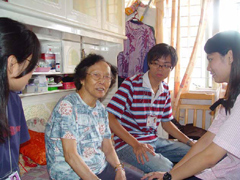 |
The latest by-census revealed how quickly
Hong Kong is ageing. The birthrate is falling as fewer young
women choose to marry and raise children. Meantime, increased
life expectancy causes problems for healthcare and social welfare
provision, increasing the burden of general care already on
younger generations. Such burdens cause resentment and, in
the worst
cases, elderly people are neglected or abused as a result.
We all need to think clearly what to do about these problems
so that respect for the elderly within a harmonious community
can survive.
|
One solution is to bring the young
and the aged together now. Our young volunteers reach out to
the elderly, learning how to communicate across generations.
They can gain perspective and a sense of continuity through
the elders' collective memory which will help them to cope
with today's pace of change. When young people have patience
to listen to the senior citizens who have contributed so much
to Hong Kong, the generation gap is bridged and values are
shared. This is the attitude we encourage. Will you help us
convey the message?
Contact Anna Lau, Youth Volunteer Network, tel
2169 0032 and read this week's Feature Story about volunteers
who
visit the
elderly. |
| Feature
Story |
| Two caring generations
Many elderly people live lonely lives in
poverty or on welfare payments. Some are neglected by their
families and can be as vulnerable as the young. A dozen
youth volunteers talked about their experience of visiting
them, what they learned and how important it is. Sin-kuen
began
with
a
Chinese saying:
'When drinking water think of
its source, that's a way of explaining why
I help.'
Giving unconditionally was a common theme among the volunteers,
doing something without reward or obligation. Sharon, who
is in her 20s and does voluntary work in her spare time,
understands the importance of reciprocity:
|
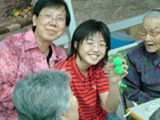 |
'I try to take a small gift with me. It gives us something
to start talking about. Talking, really communicating,
not just passing the time of day, that's what's really
important. If you can do that, you begin to understand
and help each other.'
Sin-kuen agreed:
'Listening is so important. That's one of the things
they most miss, someone who will sit and listen. But
when you respond you have to be careful not to promise
something you aren't sure you can give. They don't forget
your promises.'
|
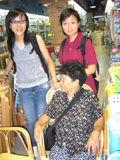 |
'We brighten up their day,' said
secondary student, Tommy who was echoed by Paula, 'We
can help them to be positive. It's not always easy when you
feel old and frail. They teach me to value my own health
more.'
'I like to be useful,' said Amy, who is at work
like Sharon and finds time for weekend visits. 'Lending
a hand with the household chores and shopping means a lot
to some of the elders I visit. What many of them miss most
is strength and energy.'
|
Very few of the dozen volunteers we interviewed had grandparents
living at home with them but secondary student Erica was
one:
'My parents brought me up to care about people in
need and I often help granny. She likes to chat and play
as well. Maybe that's one reason why I enjoy helping
other elderly people. I know it can be fun.
|
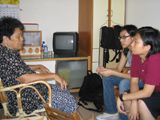 |
Being practical is very important but the
volunteers learned practical skills from the elders too.
Erica learned how to cure her headache without taking painkillers.
Minerva, Hayley, Sin-kuen and Paula all said they learned
how to communicate better and admired the way the elderly
coped with hardship.
Paula and Sin-kuen knew elderly people who were learning
new languages and computer skills, realized how much determination
it took and saw that it's never too late to learn. Jacky
even improved his own language skills and learned to do
simple repairs as well.
Visiting as a volunteer has made me realize that I
should make more of an effort with my own grandparents,' said
Gloria. 'I can cheer them up and make sure they aren't
bored. I've learned how to cook as a result of being
a volunteer.'
Sharon, Eric and Joyce saw the positive attitude to life
that the elderly had, the unimportance of material wealth
for them, especially compared to health, and the need to
treasure the present.
Families mean such a lot to people who live alone
but they can't always be there. That's when we can help,' said
Fanny who is in secondary school like Jacky, who added,
'They just want to feel included, like anyone else.'
Sharon and Sin-kuen said how difficult it can be to talk
about friends and relations:
'We have to be very careful if we talk about families
and the past. Sometimes it can be upsetting because it
represents what they have lost,' said Sharon while
Sin-kuen commented:
'They are different from us in many ways so I always
ask if they'd like to talk about the past. It can make
them
very emotional and we need to understand that.'
|
Given how thoughtful and kind these responsible
young adults are, it was no surprise that they saw volunteering
as a way to give back to the community. Hayley also said
she learned that she could 'create value both in their lives
and in my own.'
One other answer was unanimous:
'Volunteering makes you feel good!'
This is a well-known side effect of volunteering. Why not
try and see? Do both yourself and the needy a favour.
Call the Youth Volunteer Network, tel 2169 0032 for details. |
|
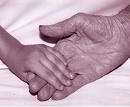 |
| Upcoming
events |
The
Standard Chartered Hong Kong English Public Speaking
Contest 2007
Grand Final and Award Ceremony
|
Date: Friday 16 March 2007
Time: 6:00 pm - 8:00 pm
Venue: Hong Kong Academy of Medicine
|
| |
| Joint
Opening Ceremony of Modernized Youth S.P.O.Ts |
Date: Saturday 24 March
2007
Time: 2:30pm
Venue: HKFYG Jockey Club Farm Road Youth S.P.O.T.
Guests of Honour: The Hon Leung Chun-ying,
GBS, JP, Non-Official Member, Executive Council
Mr William Yiu, Executive Director, Charities, Hong Kong Jockey
Club
Mr Cheung Hing-wah, Assistant Director, Social Welfare Department
Ir. Wong Kwok-keung, JP, Chairman, Kowloon City District Council
*A live broadcast of the Ceremony will be shown at HKFYG's
Jockey Club Ping Shek, Verbena, Wang Tau Hom and Cheung Wah
Youth S.P.O.Ts |
| |
| Leaders
to Leaders Lecture Series 2006/07 |
Speaker: Mr Charles Peter
Mok
Chairman, Internet Society Hong Kong; Director, Computancy
Ltd
Topic: Seizing the Moment
Date: Thursday 29 March 2007
Time: 6:00 pm - 8:30pm
Venue: Rayson Huang Theatre, HKU
Participants: 300 nominated student leaders and university
students
More details at: http://www.leadership21.org/courses/ltl/guestinfo.doc
and http://www.u21.org.hk/partnership/issue92_jan2007/images/LTL.jpg |
| Facts & Figures |
| Latest Statistics in HKFYG
youth poll on the definitions of rich and poor |
519 young people aged 15-34 were interviewed
by the Federation between 26 February and 2 March this year.
Over 40% said being rich equalled to having at least 1 million
in cash, 30.8% related wealth to owning property and 30.6%
said it meant earning at least $30,000 a month. 58.4% thought
that being poor meant being unable to make ends meet. 41.8%
said poverty meant earning less than $5,000 per monthly, (half
the median wage in Hong Kong) and 35.3% thought poverty meant
being deeply in debt.
When asked how the condition of the poor could be improved,
almost 80% said that if they were poor themselves they would
have confidence in their own ability to improve their living
standards
through their own
efforts. 42.9% said that if they were poor they would
upgrade their skills
and
abilities
to
remedy
the
situation.
31.8% thought
laziness was the root of poverty. 57.6% said they would feel
unhappy if they were poor while 48.6% said they would be looked
down upon.
|
| |
Age catching up with youth
Since the 1970s Hong Kong's population has
been aging rapidly. Low fertility rates are causing a gradual
decline in population growth and a shift in the population's
age profile. The fertility rate dropped from about 3.5 in
the early 1970s to 0.9 in 2004, well below the replacement
rate of 2.1.* Population growth slowed to 0.4% in the past
5 years compared to 0.9% from 1996-2001 when the last full
census was taken.**
|
|
 |
At the same time, life
expectancy remains high and is projected to reach 82 for
men and 88 for women by 2031. At that time, the size of the
population aged 65 or above will be over two million, meaning
that one in every 4 people in Hong Kong will be aged 65 or
above. These facts were confirmed by the 2006 Population
by-census which also revealed that the median age has risen
from 34 in 1996 to 39 in 2006.
Aging is likely to slow economic growth in Hong Kong SAR
and to put pressure on public finance. The demographic effects
will start setting in about 2015, when the labor force support
ratio is projected to peak and the number of those in work
compared to those who depend on them for welfare will begin
to grow markedly. An estimated 80,000 elderly people live
alone in Hong Kong and 30,000 of them were described as the
“hidden elderly” by the Social Welfare Department in a recent
radio broadcast.***
The by-census figures on marriage and families also revealed
trends significant for demographics. In 1996, 28.9% of all
women had never been married. This figure rose to 30.7% in
2006. The number of never-married men rose from 34.2% to
34.3% in the same period.**** Of the 50,300 marriages registered
last year, 28,000 of the men married mainland wives. Data
also showed a switch to a female-dominated city with 1,000
women to every 911 men with the average household size dropping
from 3.3 to 3 with a big increase in single-person households,
from 16,000 in 1996 to 41,000 in 2006.
|
The
Hong Kong Federation of Youth Groups, one of Hong Kong's
largest youth work agencies, has provided opportunities,
facilities and services to youth for over 40 years.
|
|

